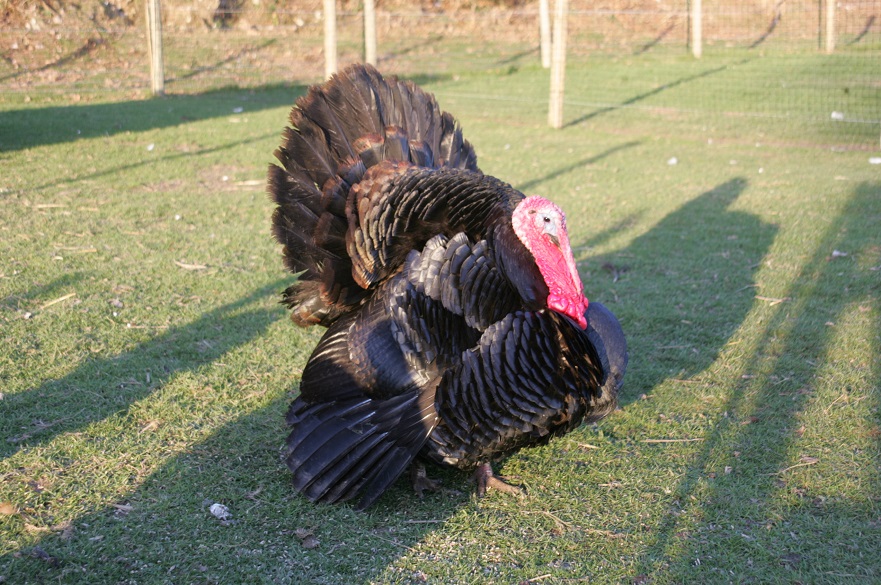Commercial advantage: new research shows better leg health and tenderness in native breed turkeys
New scientific research released today shows that native breed turkeys have stronger leg bones than commercial strains of turkey within the study.
By Dave Rogers | Published on 10 December 2020
Categories: Press office; Research; School of Animal, Rural and Environmental Sciences;

The research project, a collaboration between Rare Breeds Survival Trust (RBST) and the Poultry Research Unit at Nottingham Trent University, also found Norfolk Black native breed turkey breast meat to be more tender than commercial turkey breast meat.
There are currently 11 native breeds of turkey on the RBST Watchlist for rare poultry, including the Slate, Norfolk Black and British White breeds. RBST is encouraging poultry farmers to consider the commercial advantages which are associated with the findings of the new research.
RBST Chief Executive Christopher Price said: “These findings highlight two important commercial advantages for farmers who choose native breed turkeys. Firstly, stronger leg bones can reduce the losses from lameness that are an ongoing concern for many commercial turkey businesses.
“Secondly, the improved tenderness of the native breed turkey meat is appealing for consumers, particularly as the trend grows for eating less meat but choosing high quality products that are sourced locally and which are reared in high welfare systems.”
Eight native breed turkeys (Norfolk Black and Slate breeds) were compared to a test set of 20 commercial birds, with measurements taken at 12 and 18 weeks for the commercial strains in order to benchmark meat quality in the native breeds. Tenderness was measured as the force exerted on the sample in order to elicit a representative change in tension. Bone strength was assessed by measuring tibia and femur strength per kilogram of bird weight.
The research project was led by Nottingham Trent University’s Professor Emily Burton and RBST Head of Conservation Professor Philippe Wilson, also a Professor in the School of Animal, Rural and Environmental Sciences at NTU.
Professor Emily Burton said: “Whilst native breeds of livestock such as these turkeys are rare, this is not because they are not good food sources, it is because not many are kept and they take a long time to grow when compared to their commercial friends. We need commercial turkey meat for the market, and this suggests that whilst these strains are excellent as being batch produced and offered to consumers, native breed turkeys can also be a tasty alternative, and are good strong birds.”
The full report, ‘An investigation into the production qualities of native breed and commercial turkeys: a pilot study’ can be obtained from RBST.
Notes for Editors
Press enquiries please contact Dave Rogers, Public Relations Manager, on telephone +44 (0)115 848 8782, or via email.
Rare Breeds Survival Trust (RBST) is the sole charity dedicated to promoting and preserving the UKs rare and native breeds of farm livestock. Started in 1973, RBST monitors numbers of animals, and threats of inbreeding and geographical concentration. It promotes the breeding and registration of rare and native breeds. Through its 4,500 members, staff and support groups it provides a network of knowledge to support and encourage breeders to reduce these threats. See the website www.rbst.org.uk.
Native breeds provide a major contribution to our rural economy, both economic and culturally. There are around 30,000 herds and flocks of native breeds in the UK. They contribute over £700 million to UK local economies.
NTU was named University of the Year 2019 in the Guardian University Awards. The award was based on performance and improvement in the Guardian University Guide, retention of students from low-participation areas and attainment of BME students. NTU was also the Times Higher Education University of the Year 2017, and The Times and Sunday Times Modern University of the Year 2018. These awards recognise NTU for its high levels of student satisfaction, its quality of teaching, its engagement with employers, and its overall student experience.
The university has been rated Gold in the Government’s Teaching Excellence Framework – the highest ranking available.
It is one of the largest UK universities. With nearly 32,000 students and more than 4,000 staff located across four campuses, the University contributes £900m to the UK economy every year. With an international student population of more than 3,000 from around 100 countries, the University prides itself on its global outlook
The university is passionate about creating opportunities and its extensive outreach programme is designed to enable NTU to be a vehicle for social mobility. NTU is among the UK’s top five recruiters of students from disadvantaged backgrounds and was awarded University of the Year in the UK Social Mobility Awards 2019. A total of 82% of its graduates go on to graduate entry employment or graduate entry education or training within six months of leaving. Student satisfaction is high: NTU achieved an 87% satisfaction score in the 2019 National Student Survey.
A total of 82% of its graduates go on to graduate entry employment or graduate entry education or training within six months of leaving. Student satisfaction is high: NTU achieved an 87% satisfaction score in the 2019 National Student Survey.